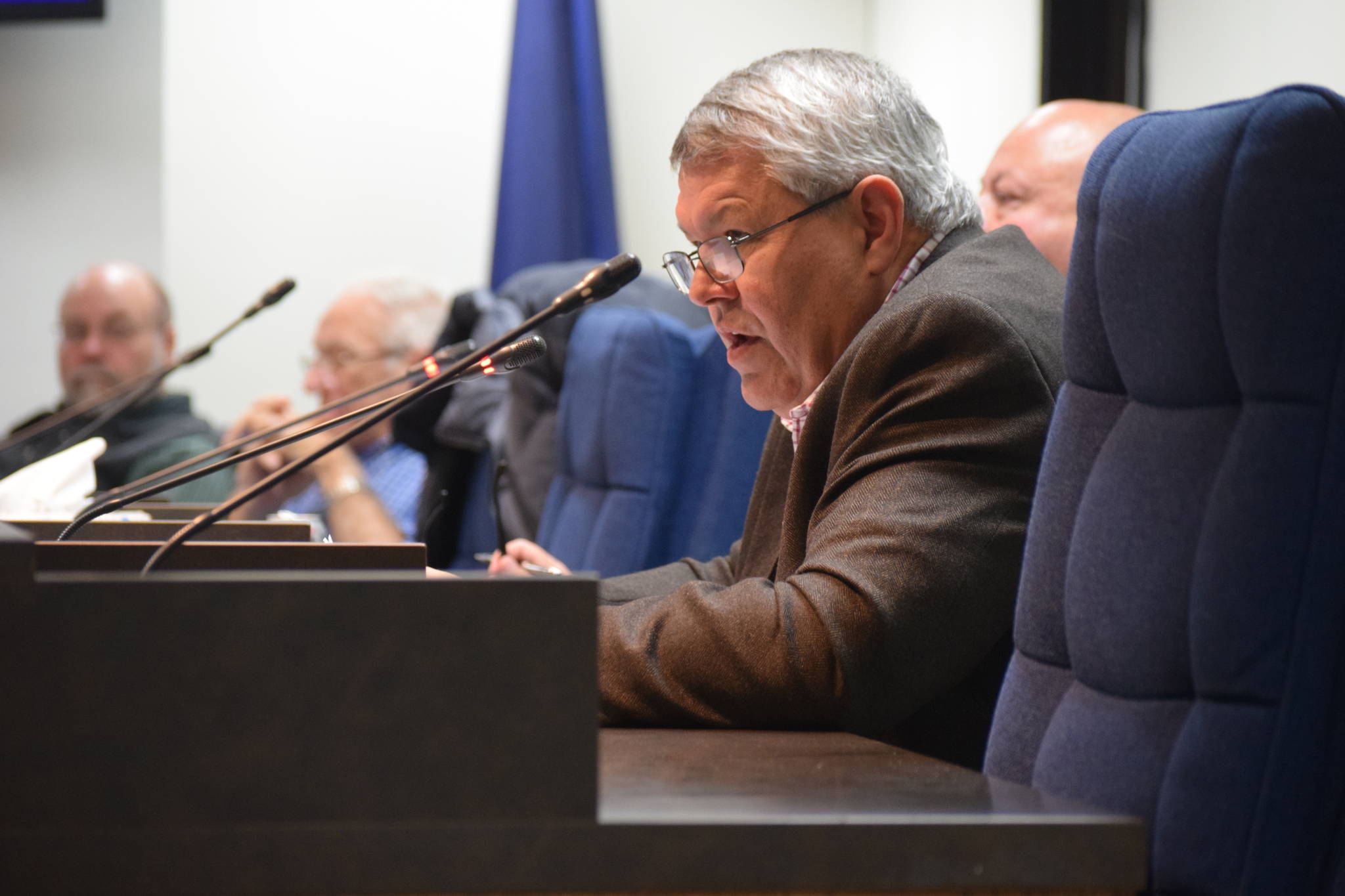The Kenai Peninsula Borough unanimously passed a resolution at the March 5 borough meeting to support modifying two bills that would allow the state to retain tax funds from borough oil and gas properties.
Senate Bill 57 and House Bill 59 would repeal the levy of tax by municipalities on oil and gas properties and repeal the credit for municipal payments against the state levy of tax on oil and gas properties.
If passed, the state legislation would provide an estimated tax revenue of $450 million to the state next fiscal year, according to the resolution.
Borough Mayor Charlie Pierce and Assembly Vice President Dale Bagley introduced the resolution, which encourages amending SB 57 and HB 59 to allow municipalities to levy oil and gas property tax up to 15 mills. The state currently levies an annual oil and gas property tax of 20 mills. Municipalities are able to levy taxes up to that amount on oil and gas properties, with the remaining revenue going to the state. The highest tax rate levied against any oil and gas property in the borough is currently 10.33 mills and the lowest rate is 4.70 mills, according to the resolution.
Mill rates are set annually by the Borough Assembly, municipalities and service areas boards, according to the Kenai Peninsula Borough website. A mill represents $1 of tax for each $1,000 of taxable assessed property value.
The borough receives nearly $15 million in revenues from oil and gas properties, making up more than 18 percent of the borough’s revenues for the fiscal year 2020 budget. The resolution states that if SB 57 and HB 59 were to pass, the reduction in revenue would cripple the Kenai Peninsula Borough’s ability to fund education, maintain and improve roads throughout the borough outside of the cities; provide services like 911, hospitals, solid waste, fire and emergency medical, senior citizen and recreational services to visitors and residents in the borough.
If such a reduction took place, the borough would seek other sources of revenue, likely in the form of radical increases to local taxes and fees, according to the resolution.
Originally, the resolution supported local municipalities’ right to retain a maximum of 10 mills on taxable oil and gas property. The resolution was modified by Bagley, who changed the maximum from 10 mills to 15 mills.
Tim Navarre of Kenai gave public testimony on the resolution and told the assembly that asking for a maximum of 10 mills was not a fair deal for the borough.
“In this budget crunch that’s happening all over, we’re trying to find compromises,” Navarre said. “If you’re going to do compromises, you got to have everything on the table and see what you end up with before you give everything away. If we’re taxing them 17 mills, we should get the 17 mills from the oil and gas properties that are in our community… Now they want to take our oil and gas properties and say that doesn’t count. At the minimum, it should be 15 percent, but I don’t think we should play our whole hand until we see all the negotiations.”
Paul Huber from Nikiski also brought up concerns over how the resolution could affect his community.
“I really support this resolution, but I would ask that a greater impact is included on what would happen to Nikiski,” Huber said.
Huber said if SB 57 were to pass, the rate for the Nikiski Fire Service Area would jump up to 17 mills. Around 60 percent of the Nikiski Fire Service Area’s budget is generated from oil and gas properties.
“If we’re willing to tax ourselves up to 17 mills — especially the Nikiski fire service, which provides a service to that industry that it is taxing — we should be able to tax them the same as we are willing to tax ourselves,” Huber said. “I would like to see more clarification in this, but it’s a foot in the right direction.”
Before passing the resolution, Assembly President Wayne Ogle said he supported the resolution and thanked Navarre for the suggestion to raise the maximum mill rate. He also expressed concern about the resolution’s impact on Nikiski.
“I would like to have seen a little more language discussing the impact on Nikiski, especially the $5 million fire budget and $3 million would be ripped out of it because of this, but I’m also aware that we need to get this out.”
Ogle said he wanted to focus on getting the resolution to the Legislature, which is currently considering both state bills.
“Down in Juneau things are starting to solidify in certain directions,” Ogle said. “The governor’s heart is hardening on certain issues, and it is very difficult once the heart is hardened on certain issues, to overcome that. So rather than delay or to not get it down there, I think there’s sufficient language in there to give the clear impression to the governor that such a disturbance to our oil and gas mill rate would be very catastrophic to all of our service areas in the Kenai Peninsula.”
A copy of the resolution will be sent to Gov. Dunleavy as well as members of the Alaska House of Representatives and Alaska State Senate.

